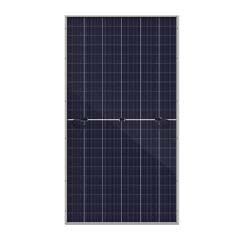Choosing Solar Panels: The Three Key Types You Need to Know
Apr 21, 2025
Choosing the right solar panel is a critical step toward achieving energy independence and sustainability. Whether you’re a homeowner or a business, understanding the strengths and limitations of each solar panel type will help you make the most informed decision for your energy needs.
The Basics of Solar Panel Types
Solar panels are primarily divided into three types: Monocrystalline Silicon Solar Panels, Polycrystalline Silicon Solar Panels, and Thin-Film Solar Panels. Each type has its own unique features, pros and cons, and ideal use cases. Understanding these characteristics will help you make an informed decision.
1. Monocrystalline Silicon Solar Panels
Features
Monocrystalline silicon solar panels are made from high-purity silicon wafers and offer very high efficiency and durability. They typically have a black appearance and round or rounded-edge rectangular shapes, making them popular for their high energy conversion rates.
Advantages
High Efficiency: Monocrystalline panels typically have an efficiency range of 18% to 22%, making them ideal for installations with limited space.
Long Durability: These panels have a long lifespan, often lasting 25 years or more.
Ideal for High-Demand Applications: They perform especially well in sunny regions, providing higher energy output.
Disadvantages
Higher Cost: Due to their complex manufacturing process, monocrystalline panels tend to be more expensive, making them more suitable for those with a larger budget.
Best Use Cases
Monocrystalline panels, such as the Full Black N-Type Solar Panel options, are perfect for residential, commercial, and industrial applications, especially for users with higher energy demands or limited installation space. They offer an ideal solution for those seeking efficient and long-lasting solar energy.
2. Polycrystalline Silicon Solar Panels
Features
Polycrystalline silicon solar panels are made from multiple silicon crystals and usually have a blue appearance. While they are slightly less efficient than monocrystalline panels, they offer a cost-effective alternative.
Advantages
Lower Cost: The manufacturing process for polycrystalline panels is simpler, making them more affordable.
Good Stability: While their efficiency is slightly lower, they still provide reliable energy output in most applications.
Disadvantages
Lower Efficiency: Polycrystalline panels typically have an efficiency range of 15% to 18%, which means you may need a larger area for the same energy output.
Shorter Lifespan: Polycrystalline panels generally have a shorter lifespan compared to monocrystalline panels.
Best Use Cases
Polycrystalline panels are ideal for homeowners or small to medium-sized businesses on a budget, especially when larger installation spaces are available. They provide a cost-effective solar energy solution.
3. Thin-Film Solar Panels
Features
Thin-film solar panels are made from thin layers of semiconductor materials and can be applied to various surfaces, including curved or irregular surfaces. They generally have lower efficiency but offer flexibility in large-scale installations.
Advantages
High Flexibility: Thin-film panels can be applied to different surfaces, making them suitable for irregular or curved areas.
Low Cost: Thin-film panels are usually cheaper to produce due to the simpler manufacturing process.
Lightweight: These panels are lightweight, which makes them easy to transport and install.
Disadvantages
Lower Efficiency: Thin-film solar panels usually have an efficiency range of 10% to 12%, so they require more installation space to generate the same amount of power.
Shorter Lifespan: Compared to other types, thin-film panels have a shorter lifespan, typically around 10 to 15 years.
Best Use Cases
Thin-film panels are best suited for large-scale commercial projects or solar farms, where space is not a constraint. They are also ideal for situations where aesthetics are less important.
How to Choose the Right Solar Panel for Your Needs
When selecting a solar panel, consider the following factors:
Budget
If you have a higher budget and want high efficiency and long lifespan, monocrystalline panels are the best choice. However, if you are on a tighter budget, polycrystalline or thin-film panels can provide a more cost-effective option.
Installation Space
If you have limited roof space or installation area, monocrystalline panels, like the Full Black N-Type Solar Panel, are a great choice due to their higher efficiency. On the other hand, if you have a larger space, polycrystalline or thin-film panels can offer a more economical solution.
Geographical Location
If you live in an area with abundant sunlight, monocrystalline panels will maximize energy production. In regions with more balanced sunlight conditions, polycrystalline or thin-film panels will still perform reliably.
Long-Term Return on Investment
While monocrystalline panels are more expensive upfront, their higher efficiency and longer lifespan make them a worthwhile long-term investment. If you plan to use your system for over 25 years, monocrystalline panels, such as Full Back Bifacial 440W Solar Panel, are a smart choice.
Choosing the right solar panel is a critical step toward achieving energy independence and sustainability. Whether you’re a homeowner or a business, understanding the strengths and limitations of each solar panel type will help you make the most informed decision for your energy needs.
Enecell’s all-black monocrystalline solar panels are crafted with cutting-edge technology and premium materials to deliver superior performance and long-lasting durability. With a 25-year power warranty, our panels ensure reliable energy production for years to come.


